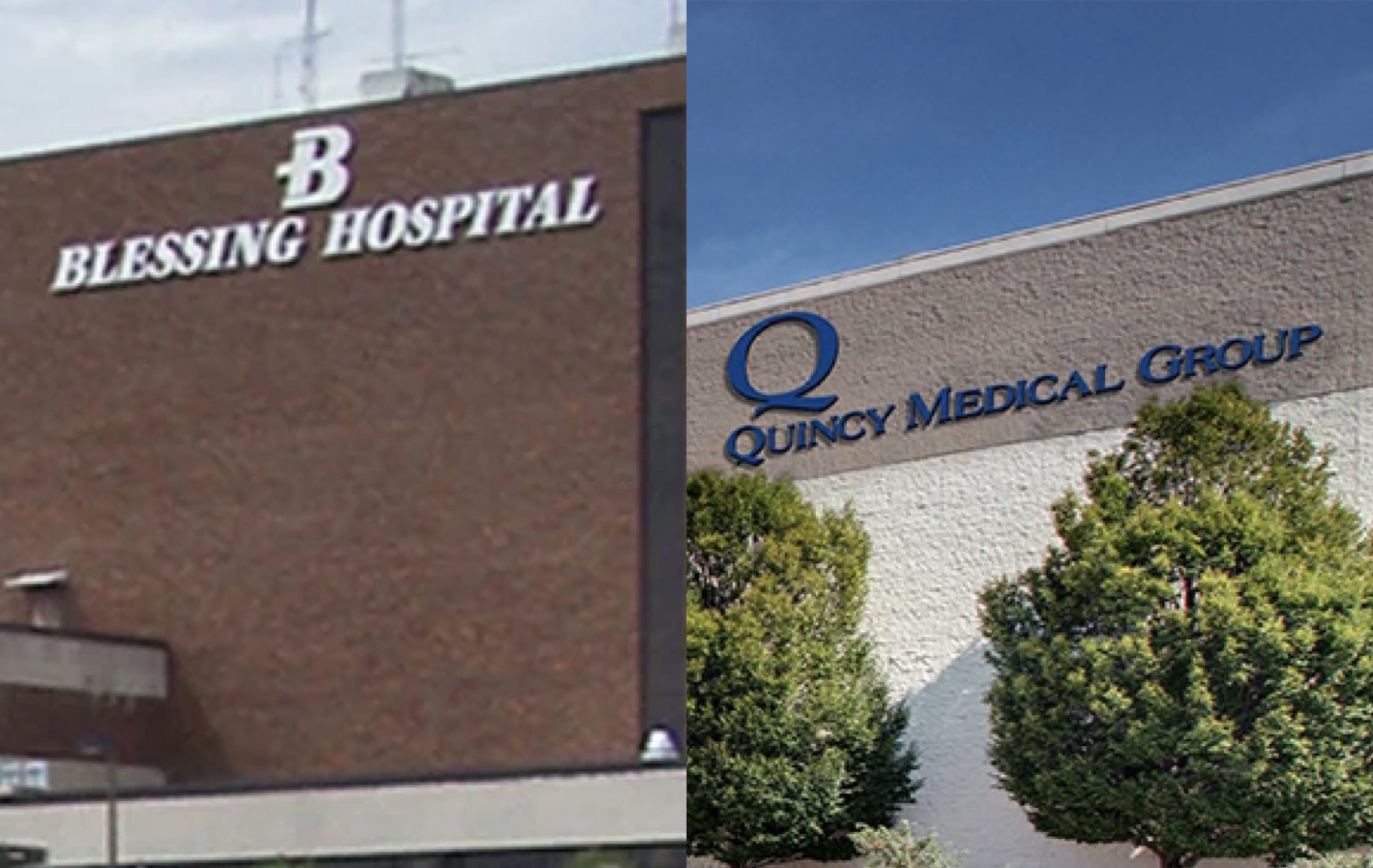Quincy’s hospital dispute revolves around private equity; Blessing fights Duly/QMG plan for competing facility by taking aim at LA-based financial backer

Reprinted with permission from Crain’s Chicago Business. © Crain Communications Inc. All rights reserved.
A big Chicago-area doctor’s group and its private-equity backers are squaring off with a downstate hospital in a fight with potentially big implications for Illinois’ health care industry.
Blessing Health System, a nonprofit three-hospital chain based in Quincy, opposes neighboring Quincy Medical Group’s plan to build a “small format” nonprofit hospital 2 miles from Blessing’s Quincy hospital, which is a so-called “safety-net” facility serving many Medicare and Medicaid patients.
Blessing is urging Illinois hospital regulators to block QMG’s plan, arguing the proposed hospital would siphon off profitable surgeries and privately insured patients that keep Blessing afloat financially.
QMG, a physician group that joined forces with Downers Grove-based Duly Health & Care in December, responds that Blessing is looking to block competition in hospital services in the downstate community.
Duly, a for-profit entity formerly called DuPage Medical Group, is the second-largest physician group in Illinois by 2021 revenue, according to Crain’s data. It is backed by Los Angeles-based private-equity firm Ares Management, a fact that Blessing highlights in its arguments to the Illinois Health Facilities & Services Review Board.
“The board should recognize this project for what it is, an attempt by a large, national private-equity company to set up a cherry-picking, profit-motivated, low acuity hospital in rural Illinois,” Blessing lawyer Anne Murphy said during a March 18 hearing.
QMG attorney Tracey Klein fired back that “the sole goal of this distraction is to preserve Blessing Hospital’s position as a monopoly in its marketplace, to prevent new entrants from entering the market.”
The controversy in Quincy is another flashpoint in the increasingly contentious debate over the growing role of private-equity firms in health care. The ruling in the case could shed light on the review board’s willingness to allow private-equity-backed hospitals and others to move into markets already served by existing hospitals.
Private-equity activity in Illinois’ health care sector
Private-equity health care dealmaking surged to $35 billion in Illinois last year on the mega-buyout of hospital supplier Medline Industries. Excluding that transaction, private-equity firms cut deals worth a total of $1.7 billion in Illinois last year, about the same as 2020’s total.
“If the project were approved, you could say that it might show a receptiveness by this particular board for new hospital projects,” says health care attorney Daniel Lawler of Barnes & Thornburg, who represents hospitals but is not involved in the QMG case.
That would worry hospitals like Blessing. Safety nets have suffered financially in recent years, particularly those operating in rural areas. Over 180 rural hospitals across the U.S. have closed since 2005, according to data from the University of North Carolina at Chapel Hill.
If QMG’s hospital is approved, Blessing says it will be at risk of losing nearly $15 million annually in federal funding given to isolated community hospitals. It also fears that QMG doctors who currently perform surgeries at Blessing will take those procedures and the revenue they generate to the new hospital.
In making its case to the board, QMG says the new hospital would provide more innovative care and services not currently offered in the area, and that more competition in the area would improve care quality and lower costs for patients.
The board is expected to rule later this month on QMG’s application for a “certificate of need,” which would allow it to proceed with construction. However, the board has already indicated that it’s unlikely to approve the deal, issuing an intent-to-deny notice last May, which QMG has appealed. Among other reasons, the board said QMG’s proposed hospital would create “unnecessary duplication of service” in the area.
Yet the board rejected arguments similar to Blessing’s in 2017, when it approved a new Mercyhealth hospital in Crystal Lake. The approval came despite a warning by the board’s staff that the new hospital would poach business from existing hospitals in the area that had space for more patients.
Ares, Blessing, Duly and QMG all declined interview requests. QMG and Duly issued a joint statement saying they “remain focused on physician directed care delivery and transforming the health care experience for patients.”
In a written statement, Blessing CEO Maureen Kahn said the QMG project “jeopardizes our ability to provide accessible healthcare for an entire region.”
While the battle in Quincy is taking place 300 miles away from Chicago, officials here are watching closely.
“Why Quincy matters to us in Cook County is that you want to make sure that it’s not the shape of things to come,” says Cook County Board Commissioner Bridget Gainer.
Private-equity firms, including Ares, have purchased and sold other hospitals and health care companies in Illinois. Ares, which has more than $300 billion in assets under management, also has a stake in The Aspen Group, a Chicago-based operator of dentist’s offices and medical urgent-care facilities.
Los Angeles-based private-equity firm Pipeline Health purchased three Chicago-area hospitals in 2019, and came under scrutiny for closing Westlake Hospital just two weeks later. Now
it’s selling its two remaining Illinois hospitals for $92 million.
Private-equity activity in health care services across the U.S. has steadily increased over the last decade, according to PitchBook. Deals totaled $77.5 billion in 2021, up from $66.3 billion in 2020 and $76.6 billion in 2019.
In Illinois, private-equity health care dealmaking surged to $35 billion last year on the mega- buyout of hospital supplier Medline Industries. Excluding that transaction, private-equity firms cut deals worth a total of $1.7 billion in Illinois last year, about the same as 2020’s total.
“Health care is probably one of the highest-potential investment areas over the next 10 or 20 years,” says Harry Kraemer, a professor at Northwestern University and former CEO of Baxter International. “People are living longer, the baby boomers are getting older and . . . every time you extend life, people are going to need more health care.”
Blessing warns that private-equity financial practices would put health care at risk in Quincy. They point out that Ares recently pulled a $209 million dividend out of Duly in a debt-funded transaction. A Moody’s Investor Service report said the distribution showed “the aggressive nature” of Ares’ financial policies and left Duly “weakly positioned.”
“This is an incredibly problematic and pretty controversial practice that private-equity firms will engage in,” says Eileen O’Grady, a research and campaign manager at Private Equity Stakeholder Project, a Washington, D.C.-based nonprofit that’s critical of private equity’s effect on essential industries. “There’s no benefit to the company itself or to the patients or to the workers. The only people it really benefits are the private-equity firms and their investors.”
Defenders of private equity say their investments can help prop up struggling hospitals and give them more time to improve operations. In a recent report, the American Investment Council, an industry trade group, highlighted private-equity-backed investment in urgent care facilities in rural areas.
“Private equity is playing a powerful role in expanding health care access to Americans living in rural communities,” AIC President and CEO Drew Maloney said in a statement.
Criticism of private equity’s health care push has intensified over the last several years, as firms have acquired nonprofit hospitals and transformed them into for-profit entities by cutting essential but unprofitable services. While the circumstances in Quincy don’t involve a takeover of Blessing Hospital, QMG’s focus on lucrative specialized services could have a similar effect, Gainer says.
“If you take higher-paying, greater reimbursement or those that tend to be covered by private insurance, and you separate those out to a purely for-profit scenario, what you do is you weaken the ability to revive the health care for everyone else,” Gainer says. “It’s really important for us to understand that the health care ecosystem exists in a balance. Before we can make changes to it, we have to be thoughtful.”
Original story: https://www.chicagobusiness.com/health-care/private-equitys-role-backing-duly-becomes-issue-quincy-hospital-fight
Reprinted with permission from the April 11, 2022 issue of Crain’s Chicago Business. © Crain Communications Inc. All rights reserved.
Miss Clipping Out Stories to Save for Later?
Click the Purchase Story button below to order a print of this story. We will print it for you on matte photo paper to keep forever.

